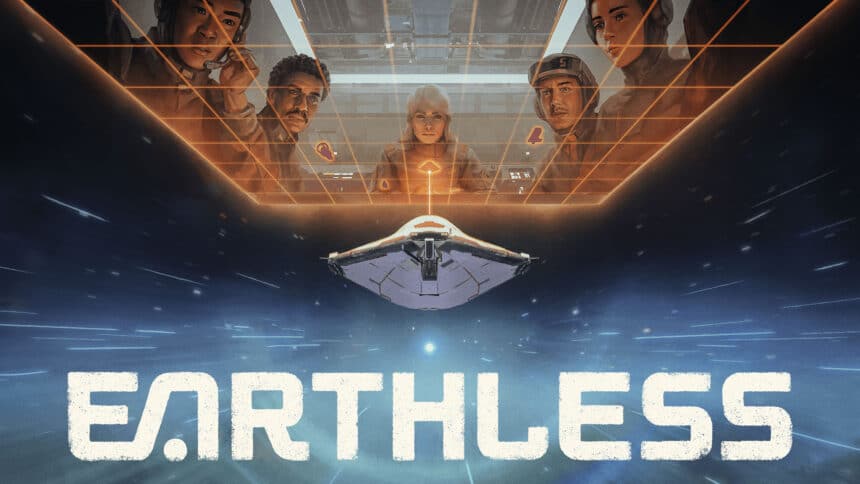Earth is humanity’s cradle. We’re born here, we live here, we create here, and finally, we die here. But, what if all that suddenly came to an abrupt end? That is the question that Earthless asks. The answer? Well, it’s up to the player to figure out the answer to that.
Earthless’ story is probably the smallest part of the game, however, it poses the most interesting question. Every mechanic, every single aspect of the game can find its root in that one question. “Can we find a new home for ourselves?” And that is exactly what I plan to do today in this Earthless Preview.
The Story of Earthless

Earthless begins with probably the most somber sight I’ve seen in gaming in a while. Hundreds of starships leap out of Earth’s orbit as the sun behind it goes supernova. What made me even sadder is the sudden realization that this is likely to happen to us too, 7 to 8 billion years from now.
We don’t really think about this event too much. After all, every person alive today will be long gone by then. Still, there’s something about contemplating the loss of mother Earth that leaves a bitter taste in my mouth. Thankfully, Earthless twists it on a positive note. Instead of keeling over and dying, humanity does what it always does. It finds a way!
The Gameplay of Earthless

Earthless is part roguelike, part space combat game, part turn-based strategy, and part crew management simulator. Honestly, there are many facets to Earthless’ gameplay, despite its simple superficial look.
It’s one of those games that’s easy to grasp, but gets more complex the more you delve into it. A thing that I especially liked is how each of the mechanics affected each other. A decision you make on the map will have drastic implications on the battle screen, and vice-versa.

For example, the crew morale system. As you clear zones and make your way through the map, you’ll encounter special events that will either boost your crew’s morale or lower it. By choosing specific events, you’ll make specific crewmembers happy, which will in turn increase their performance in battle.
However, if you constantly ignore their demands and advice they’ll become demoralized. And you know what demoralized crewmembers mean? That’s right, they’ll perform poorly in combat, which in turn will reduce the capabilities of your ship significantly. I love this mechanic. A momentary decision on the map can lead to drastic implications later on.
The Combat of Earthless

Earthless’ map may be roguelike, but its combat is grid-based. In essence, there are three variables to each encounter. The player’s ship, your cards, the asteroids, and finally, the different enemy types.
At the start you’ll get to choose from 3 starting ships, all aptly named after Sci-Fi authors (Asimov, Clarke & Verne). Keep in mind, this choice isn’t just aesthetic and it’ll actually greatly impact what sort of playstyle you’ll have to use in your next run. Each ship type comes with its own special ability.

Another factor that will greatly influence your experience is the cards that you have in your deck. Since combat is turn-based, each turn you’ll draw a couple of random cards from your deck. This introduces an air of uncertainty with each encounter. Will RNJesus come to your rescue or will you be plagued with a bad draw each turn? Nobody knows.
I really love this system. It basically forces me to use my brain in every encounter. There’s no “one tactic for every occasion.” It’s kind of like chess in that regard. Particular circumstances can give way to a multitude of potential outcomes. It’s up to you to decide which one is the most optimal one. Unless you can use a nuke that is. Nukes are a de facto checkmate.
Don’t Underestimate Your Opponents

Your ship might be a one-vessel armada, but that doesn’t mean that it’s invincible. The different enemy types will definitely put you through the wringer if you underestimate them. Sure, the basic enemy types are easy to deal with, but that drastically changes once the more advanced enemy types enter the field.
Whereas before you only had to be worried about the enemy closest to you, now you have to worry about the enemy that’s buffing his teammates from the other side of the map, or, my most hated enemy type – the Artillery. These will routinely annihilate larger portions of the grid map, which basically forces you to be on the move constantly. Easier said than done, however.

An integral part of the combat system is your Heat and Energy values. Heat accumulates with movement and with certain actions. Energy, on the other hand, is just the amount of actions you have remaining for that turn. These can be influenced by certain ship abilities and events, so as long as you’re prudent with them, you should be just fine.
Conclusion and Final Opinions

Honestly, my impressions of Earthless are mostly positive. The foundations that are present are solid. Aesthetically, the game looks wonderful and it’s very reminiscent of 80s sci-fi, which I absolutely adore. The sound design is likewise superb. It varies from dark and mellow tunes to upbeat synths and everything in between, which keeps the experience fresh at all times.
That being said, the build that I got to play is a very early build. The foundations of the game itself are great. I can honestly attest that the systems that are currently in place are exciting and polished, however, they lack substance. What is present currently is fun for a playthrough or two, but gets old really fast.
I can see this game being very fun a couple of years down the line, however, as of right now, there really isn’t that much to do. Eventually, though, I’m confident that Earthless will become one of those evergreen games that just stick with us throughout our lives. Let’s just hope.
What did you think of our Earthless first impressions? Share your thoughts in the comments below.
This preview is based on the PC version of Earthless. The key was provided by Team17 Digital.










